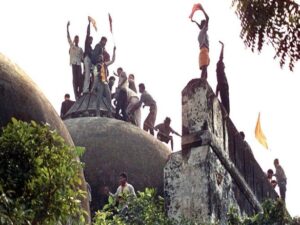 Moon Desk: Memories of that fateful day of December 6 of 1992, when the dastardly demolition of Babri Masjid in Ayodhya was carried out under the direct supervision of the entire state structure — the police, the army, the government and all the opposition parties, are still painfully etched in the minds of the Muslims of the country.
Moon Desk: Memories of that fateful day of December 6 of 1992, when the dastardly demolition of Babri Masjid in Ayodhya was carried out under the direct supervision of the entire state structure — the police, the army, the government and all the opposition parties, are still painfully etched in the minds of the Muslims of the country.
The community is also watching in dismay and despair the oddest spectacle of all and sundry leaders of secular political parties openly expressing their happiness and merriment on the construction of the Ram temple on the ruins of the masjid and, of course, India’s secularism and democratic pillar we have always been proud of.
These leaders are leaving no opportunity to congratulate the Hindus for the temple, purely for political gains as their parties have miserably failed in checking the Hindutva juggernaut of the BJP-RSS saffron bogey.
Muslims have suffered and have been suffering a lot since that shameful day when the secular fabric of the country was torn apart. Secularism and inclusiveness of all faiths have been the foundations promised by the architects of our Constitution. But all these characteristics, so assiduously nurtured by our forefathers, were made to bite the dust by the chariot L.K. Advani rode across the country.
In the immediate aftermath of the destruction of the Ayodhya mosque, over 2,000 Muslims were killed in violence perpetuated by the kar sewaks across the country.
It is not that there are no non-Muslims who are equally anguished over the daylight murder of secularism in India. Aakash Joshi writing in The Indian Express said: “There is a simple question which — for those who are lucky enough with parents, teachers, friends and role models — we are taught to ask ourselves as children.
What is the difference between right and wrong? As time goes on, the answers become mired in complexity — of life and relationships, politics and justice. People begin to understand that right and wrong are not binaries and that wrongs can be made right. Or can they?
“On December 6, 1992 — 31 years to the day — a large group of people demolished a “disputed structure”. The Babri Masjid, and whether a temple preceded the mosque on the site, was already a fraught matter that had challenged the Indian judiciary and political class for decades.
The people who demolished it did so on the backs of a chariot that traversed large parts of the country. Many claimed allegiance to the same political ideology that rules India today. The legal machinery issued a settlement order — the matter went to the highest court in the land — under which a temple is now being constructed where the mosque once stood.
This temple is the pride of the current government and ruling party. It has been a major plank of its campaigns in election after election, including the ones that led to its massive victories in Madhya Pradesh, Rajasthan and Chattisgarh just days ago. The people of (North) India seem to have expressed their support, once again, for a worldview that imagines an oppressed majority and an oppressor minority, despite evidence to the contrary.





